Business Benefits of Robotic Process Automation
Category: RPA Posted:Jun 18, 2018 By: Ashley Morrison Leading Research firms in the US have stated that the existing worldwide market scene for Robotic Process Automation is worth well over millions of US dollars in every automation focused enterprise. This trend is actually expected to swell to over 8.75 billion USD by the year 2024.
Leading Research firms in the US have stated that the existing worldwide market scene for Robotic Process Automation is worth well over millions of US dollars in every automation focused enterprise. This trend is actually expected to swell to over 8.75 billion USD by the year 2024.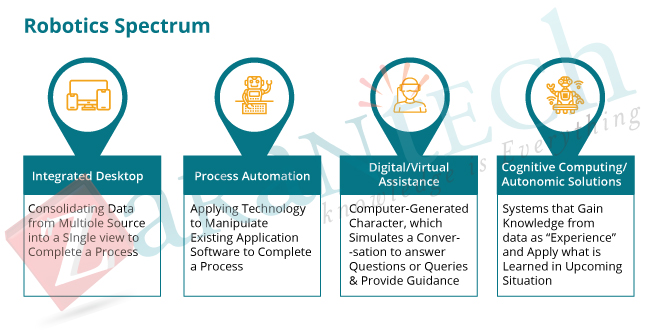
The adoption of Robotic Process Automation (RPA) has been a novelty for enterprises ever since they identified its ability to enhance operation control has been recognized by organizations and employees the world over.
When such a powerful tool is combined with conventional business solutions it can speedup digital transformation by enabling Enterprises in visualization and monitoring of business processes on end to end basis. This will form the basis for continuous process improvement in Enterprises. Such a unique platform can be utilized as a Foundation from which business can be transformed.
The adoption of RPA software on the other hand stands for massive shift from a people based model to software based model. Such an elemental change in the business approach can be Revolutionary for most organizations. Given below are the broad business benefits of RPA:
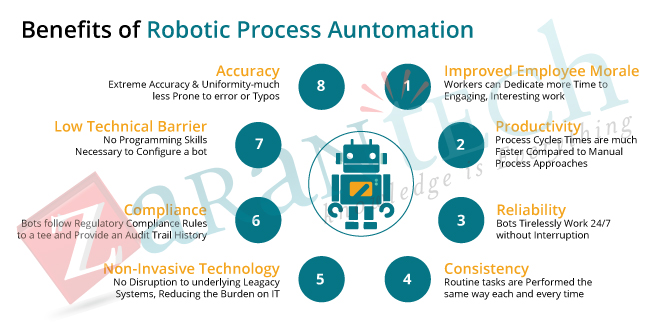
1. Complements the speed of business innovation
Being an accelerated solution RPA is simple to construct, easy and fast to implement when contrasted with conventional solutions. The interfaces within this tool are highly intuitive and do not need resources with high skill sets. An RPA solution sets itself apart from other products by linking with existing applications used in the preexisting enterprise environment instead of overhauling existing systems. Its highly non-disruptive and integrated nature is greatly conducive for Enterprises looking to introduce change into business processes without causing business loss and downtime.
2. Enables enhanced compliance
Enterprises operating in strictly regulated business environments are most affected through the adoption of advanced Technologies such as RPA, Machine Learning and AI. Most organizations have even begun integration of such technologies into their current digital transformation plans. This in turn means that the increase in adoption of such technologies has brought huge amounts of advantages in terms of enhanced compliance.
a. All types of transactions are recorded and steps which are predefined are executed by software. This will also mean eliminating manual errors and offering complete transparency to those who audit.
b. Robots are highly capable of performing repetitive and labor intensive tasks associated with compliance and risk including the implementation of reconciliation and routine control automation which will greatly decrease employee workload.
3. Deliver better customer experience
Data from the enterprise Forrester has shown that over 72% of Enterprises put enhancing customer experience as their central focus as opposed to other business objectives.
Along with countless applications coming up every day, customer data seems to be scattered across organizations. When search data is updated manually in respective systems the turnkey processes that are involved with the data including customer interaction can suffer very real delays. Robotic process automation aims to bridge the gaping distance between several systems to offer if not wholly real time at least nearly real time updates. Manual tasks can be greatly accelerated with a much higher degree of accuracy using software. This will also mean employees getting the time they need to focus on customer interactions which are the central focus of every company. Customers will also benefit from the employees having more time for value based tasks.
4. Increased Productivity and quick ROI
RPA market is projected to grow at a great pace doubling every half year reaching over 5 billion US dollars by the year 2020 itself. Adoption of Robotic Process Automation technology is gaining a lot of momentum and this can be attributed to highly accurate results and as mentioned earlier. A quicker return on investment is also a great benefit. It is an obvious fact that robots have higher decrease of efficiency than human ploys as they can function 24 hours day and Sunday to be provided there is a constant supply of electricity. Robotic Process Automation on proof-of-concept basis can be done within the time period of a few weeks and without affecting mainstream it processes and infrastructure. And the actual Robotic Process Automation rollout can be done in a period of few months as opposed to a few years as earlier thought.
Conventional approaches to business process automation become almost obsolete with it becoming critical to tap into emerging Technologies such as RPA.
RPA Tech permits a software robot to imitate human behavior. For instance it care make its way enterprise software such as FSM software ERP systems or even service management tools. This can be done using application user interfaces just as a human would. What’s the difference with the robot is that it is able to work at exponentially higher speeds with water efficiencies without even slowing down. But RPA also has limits with machine learning and AI and such limits can be leveraged with smart machines.
How RPA fits into a Corporate Ecosystem
According to Gartner industry research it has been revealed that accounting and finance can benefit greatly from RPA software eliminating time consuming processes which are manual and which makes up an accountant daily work. RPA ends up offering data access in a real time basis to financial data along with analytic and reporting capabilities.
Professionals in the financial domain are contributing value from a strategic perspective through the consistent use of RPA. This will boost the bottom line of a company.
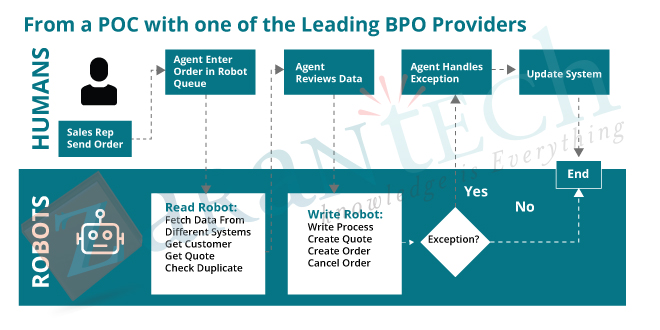
RPA is a method to take on internal processes and streamlining those deals with people and technology playing their part in perfect sync. This will allow for greater insight into opportunities and Trends for businesses worldwide. Robotics process automation works well with regular tasks, time bound and that needs manual inputs. Software robot makes use of application user interfaces and uses very few alterations if needed for execution of the task.
Benefits of implementing RPA software for your company:
1. Reduced costs:
Task automation has always held great potential for cost Savings, and in this case it goes up to nearly 30%. The productivity will remain same as we hire for the cost will be lower than 30%. Software robots cost much lesser than full time employees when it comes to repetitive tasks.
2. Better customer experience
When you deploy RPA high value resources within the company can be used to hone customer success. And people no longer have to work on mundane tasks that will reduce their efficiency and eat up the bottom line.
3. Lower operational risk
You can remove human error completely such as knowledge gaps and fatigue. You can also decrease the errors in turn providing low levels of operational risk. For a company to succeed it needs to maintain its operational risk to a bare minimum.
4. Improved internal processes
Artificial Intelligence and Robotic Process Automation require companies to state governance processes and procedures in clear terms. This will lead to accelerated on boarding internal reporting and other associated activities that happen within the company.
5. Does not replace existing IT systems
The biggest benefit of adopting and RPA is robots or a virtual work force as it is also called is that you need not replace existing software infrastructure and Systems. In the place of such disruptive practices, Robotic Process Automation can tap into existing systems and smoothening process is just like a human employee is able to do.
Automation and artificial intelligence ensures that advanced Task are consistent and have a set Rhythm and flow providing existing on Employees with great of freedom from redundant administrative work. This means employees can focus on innovation in key performance endeavors such as product development and customer service and eventually add to the bottom line of the company in a great way.
There are great many benefits of RBI throughout spectrum such as HR analytics and whole lot more.
Overall Business benefits
1. Improved business results.
The focus should be on employees looking to activities which have higher value add factor which in turn it enhances business metrics across the departments of the organization. The impact of such high value adds tasks will depend on the focus of the company.
You need to consider the business objective of an organization to realize the effect on the company bottom or top line. Existing designations and positions already present with you will work as a stepping stone for jobs with higher value add. For instance a Call Centre professional who is cold calling customers with brand new offers will make idealistic face to face sales personnel as well. They will also be greater conversion rates with it minimizing stepping stones such as the lower value add position transformed into automated processes with human employees stressing on higher value add activities.
2. Reduced wage costs
This will also mean that it might lead to job loss and higher rates of unemployment and underemployment. Robotic Process Automation rollout will lead to a great deal of cost savings ranging from 25 to 60%. Andrew NG is a leading artificial intelligence expert which has predicted that I will lead to job loss who work in shops that are capable of automation and lacking in skill sets required for non-automation jobs
Financial corporations such as banks and other institutions are predicting that such scenarios will occur due to the presence of Robotic Process Automation, automation and existing work force scenario. In industries such as these where there is tight regulation, CEOs need to be careful when talking about downsizing and generally cutting down on the workforce. It is obvious that the government and the general public would be unhappy about people losing jobs and bringing about an overall negative perspective about regulatory decision making. The CEO of Deutsche Bank John Cryan has recently been quoted saying that a massive number of bank employees can be replaced due to automation taking over.
This means that automation is bound to make a significant number of personnel redundant. But such a scenario can easily be resolved by up-skilling employees in various functions and providing opportunities across departments and companies as well.
Companies can also provide horizontal growth for employees meaning to say fitting employees into relevant positions within the company with different skill sets and requiring different functional assets in terms of skills. This should be probably the easiest solution. Redundant employees can be reintroduced into the enterprise by up-skilling them and starting them off with new positions of responsibility across enterprise departments. When appropriate opportunities for up-skilling of employees are hard to come by, companies can support their employees through severance packages that are generous and provide free training to prepare them better for the next opportunity that comes along.
When companies don’t require altering the headcount and especially decreased Awareness of automation will mean that the workforce will be but trained for changes in the organizations’ automation plans. This is also a step ahead towards lean management of employees in the organization.
3. Reduced risk
When enterprises plan on system upgrades most of the time it goes over the planned budget, and results delivered are mostly well below expectations. Robotic Process Automation projects are usually low risk and noninvasive in the sense that they don’t disturb existing processes and this translates into lower risk and high returns. This can also be done at an accelerated pace when compared to other solutions.
Benefits to Customer Satisfaction
4. Reduction of data entry errors and other manual errors
Forrester research has come up with the survey that has shown that the customers from “Uipath”(Uipath is a leading enterprise known for RPA and its implementation, based out of USA) and their managers have begun to see reduced errors as one of the major advantages of RPA. This basically refers to the elimination of human error.
After completely setting up Robotic Process Automation manual errors are all but eliminated. Manual errors other hard disc to resolve as the customer representative may not be able to pinpoint the customer who is online due to data entry problems. This means that the customers will need to come back for a face to face meeting which will take a lot more time and effort which will bring about customer dissatisfaction for sure. This can be avoided using Robotic Process Automation
However RPA is prone to a ceRobotic Process Automationin percentage of error. Robotic malfunction is a significant issue which is seen in edge cases that are not a part of test cases. Such API operations must be verified periodically to make sure that edge cases are also covered by RPA bots.
5. Faster service
Business processing and Enterprise systems are usually held back by back office processes. In most cases such downtime is caused by employees manually typing in forms into the enterprise systems. Also major portion of the time is spent copying and duplicating data between such enterprise systems. This will in turn delay service within the company. This is where bots step into save the day working at lightning speeds without any break.
Benefits to Analytics
6. Improved data quality.
Reduction of errors has widespread benefits that lead to higher quality data and will power more reliable analysis.
7. Increased scope for data collection
In Robotic Process Automation robots tend to interact with enterprise Legacy systems discovering data which was previously very difficult to extract due to its labor intensive nature. This means that analytics teams across the enterprise can have access to more data leading to more accurate analyses.
8. Reduced workload
Report automation is extremely valuable for the analytics department which enables them to stress on highly complex and custom analysis.
Benefits to HR
9. Employee satisfaction increase
One unique advantage that most server companies and Enterprises don’t mention is the inherit increased in employee satisfaction. The BCG study has proven that when employees are freed from redundant tasks employee satisfaction goes up and productivity increases as well. And when employees get focus on work with greater value add they will work better and receive more appreciation from their superiors creating a Win-Win situation throughout the Enterprise.
10. Reduced churn
If automation is adopted at the right place over time and companies can slow down the speed at which they recruit new employees for business growth. This is called churn in business terminology. This means that efficiency will go up and the enterprise will be managing a smaller but Highly Effective and productive work force. This means that you can reduce churn greatly. Churn basically refers to the influx and outflow of employees as a whole at any given point in time.
11. Employee brand enhancement and hiring costs reduction
This is a long-term and indirect benefit which comes from minimizing manual labor and boosting employee satisfaction therefore making an enterprise more appealing to prospective employees and hires on the outside. This will also facilitate smooth and better hiring.
Benefits to Technology Unit
12. Reduced workload
Business users will be enabled to use automation in their processes and information technology departments within the company will get fewer automation requests.
13. Improved focus
Any department in enterprise requires absolute focus but when it comes to Information Technology focus is critical as it has progressive and challenging tasks which involved serving all departments of the Enterprise. Lesser automation associated work will allow it to focus more on essential technological problems preparing the company for the future.
Compliance Benefits
14. Fraud Reduction
RPA means human contact with sensitive data and processes can be reduced to great extent this means that associated compliance and fraud issues will also be cut down greatly.
15. Seamless, transparent audit trail
Another major and often overlooked advantage is that the paper trail or audit process can be maintained flawlessly enabling a detailed audit in case any issue or problem arises.
Conclusion
RPA is the way of the future and is change that can be implemented in a highly scalable manner. Such automation will ensure that employees benefit as much as organizations by working with people and not in direct competition with them. This means reduced job displacement and happier employees. Robotic Process Automation is essential for anyone to succeed in today’s fast paced IT market.
Stay tuned with us for more such posts related to RPA!! You can also visit our website. Zarantech will help you skyrocket your career with self-paced online training on various aspects of RPA feel free to visit our course page.
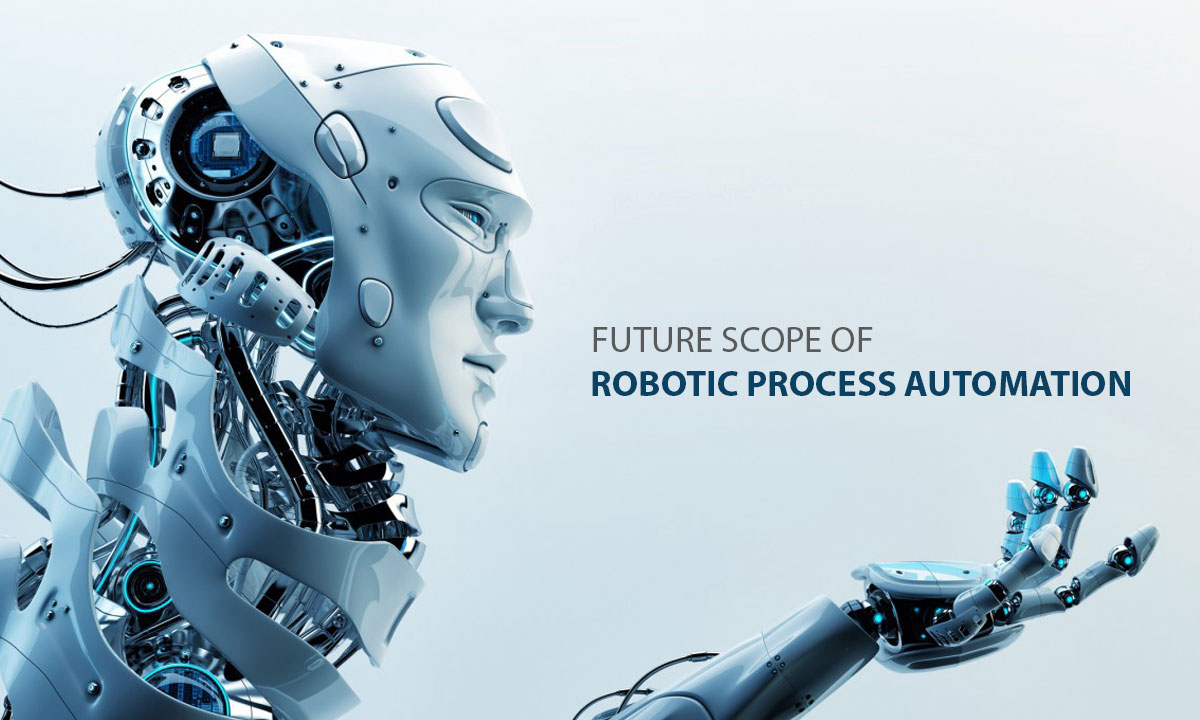

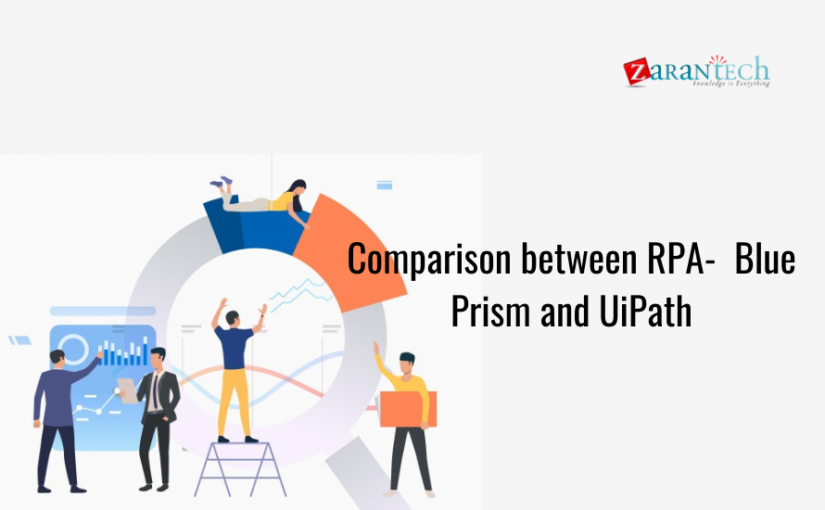
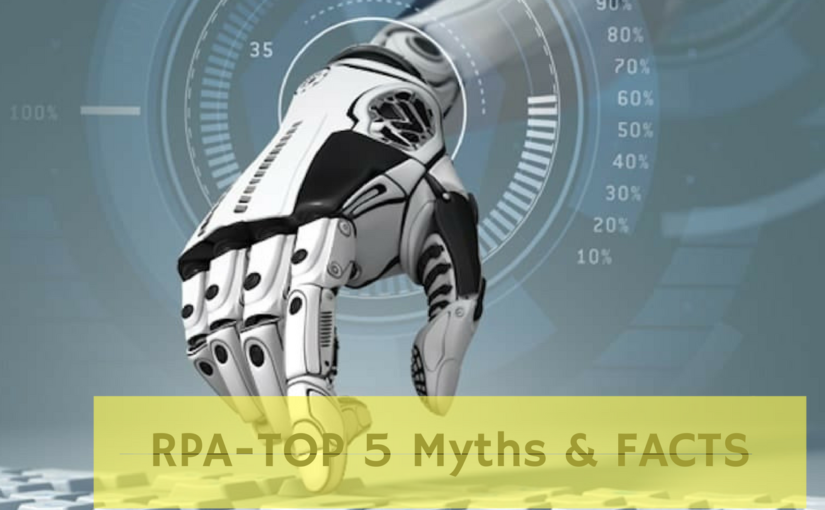

 99999999 (Toll Free)
99999999 (Toll Free)  +91 9999999
+91 9999999